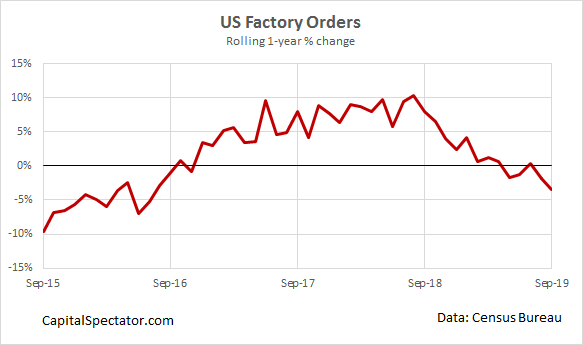US and China agree to scrap tariffs in phases: Reuters
US tariff collections rose to a record $7 billion in September: WSJ
Global growth continues to slow, close to stagnant pace in Oct: IHS Markit
German industrial output continued to fall in September: Bloomberg
European Commission trims outlook for eurozone economic growth: Bloomberg
IMF downgrades Eurozone economic outlook: IMF
US worker productivity fell in Q3 — first drop in 3 years: Bloomberg
Inflation Expectations At Record Low As Treasury Forecast Rises
Confused about the outlook for US inflation? Yesterday’s conflicting news on this front isn’t helping.
Macro Briefing | 6 November 2019
Democrats prevail in key races in Virginia and Kentucky: Reuters
Atlanta Fed’s GDPNow model: weak 1.0% US growth expected for Q4: AF
German manufacturing orders rose more than expected in Sep: Reuters
Eurozone Composite PMI: weak growth prevailed in October: IHS Markit
Japan Composite PMI signals recession for first time in 3 years: IHS Markit
Falling US imports suggest softer economic growth ahead: WSJ
Growth in US services sector picked up in Oct, rising at moderate pace: CNBC
US Services PMI: slowest rise in sector activity in Oct in over 3 years: IHS Markit
US job openings fell to 18-month low in September: CNBC
Risk Premia Forecasts: Major Asset Classes | 5 November 2019
The expected risk premium for the Global Market Index continued to tick higher in October, rising to an annualized 4.8%. The estimates marks a fractional gain over the last month’s estimate. Compared with the estimate from 12 months earlier, today’s revised long-term risk premia projection for GMI has also edged up — from a 4.5% estimate in October 2018 (see table below). GMI is an unmanaged market-value-weighted portfolio that holds all the major asset classes (except cash). The forecast for this passive benchmark represents the ex ante premium over the expected “risk-free” rate for the long term.
Macro Briefing | 5 November 2019
US and China consider paring trade tariffs for initial trade deal: WSJ
China’s President Xi says he has ‘confidence’ in Hong Kong leader: BBC
OPEC trims oil-demand forecast, citing “stress” in world economy: CNBC
US formally begins exiting Paris climate agreement: Reuters
UK services sector remained stagnant in October: IHS Markit
Eurozone producer price inflation fell to 3yr low: -1.2% in Sep: Eurostat
Slightly stronger modest growth expected for ISM Non-Mfg Index in October
US factory orders fell 3.5% in Sep vs. year-ago level–weakest in 3 years:
US Stocks Led Most Global Markets Higher Last Week
Equities in the United States edged out the rest of the world for the trading week’s performances ended Friday, Nov. 1, based on a set of exchange-traded funds that represent the major asset classes.
Continue reading
Macro Briefing | 4 November 2019
US and China signal progress on trade talks: Bloomberg
South East Asian countries to sign Asia Pacific trade pact in 2020: CNBC
The Senate may in play for Dems in 2020 election: The Hill
Iran moves further away from compliance with nuclear pact: Reuters
US equity market’s rally is the world’s top performer: WSJ
Eurozone mfg recession will act as ‘severe drag’ on Q4 GDP: IHS Markit
US economic modeling favors Trump’s re-election: Bloomberg
US payrolls rose more than expected in October: Reuters
Mild recession for US manufacturing continued in Oct via ISM data: MW
PMI data for Oct reflect modest increase in US manufacturing activity: IHS Markit
Construction spending in US rose 0.5% in Sep, more than forecast: TT
US stock market volatility (VIX Index) remains close to 3-month low:
Book Bits | 2 November 2019
● The Great Reversal: How America Gave Up on Free Markets
By Thomas Philippon
Summary via publisher (Belknap Press/Harvard University Press)
A leading economist argues that many key problems of the American economy are due not to the flaws of capitalism or the inevitabilities of globalization but to the concentration of corporate power. By lobbying against competition, the biggest firms drive profits higher while depressing wages and limiting opportunities for investment, innovation, and growth… American markets, once a model for the world, are giving up on healthy competition. Sector after economic sector is more concentrated than it was twenty years ago, dominated by fewer and bigger players who lobby politicians aggressively to protect and expand their profit margins. Across the country, this drives up prices while driving down investment, productivity, growth, and wages, resulting in more inequality. Meanwhile, Europe—long dismissed for competitive sclerosis and weak antitrust—is beating America at its own game.
US Payrolls Rose In October But 1-Year Trend Is Still Slipping
Companies added more workers than expected in October, according to the US Labor Department. The news is welcome, largely because the crowd was looking for a much-weaker gain. Good news, as far as it goes. But it’s premature to celebrate. Indeed, as The Capital Spectator projected, the one-year trend continued to edge down, reaffirming that the labor market appears to be caught in a gradual but persistent downturn.
Major Asset Classes | October 2019 | Performance Review
The old investing proverb that markets like to climb a wall of worry was reaffirmed in dramatic fashion last month. Indeed, all the major asset classes posted gains in October. In fact, the latest installment of across-the-board increases marks the third time so far this year that the crowd bid up prices in everything in a calendar month. (January and June also posted gains in every primary slice of the global markets.) Continue reading




